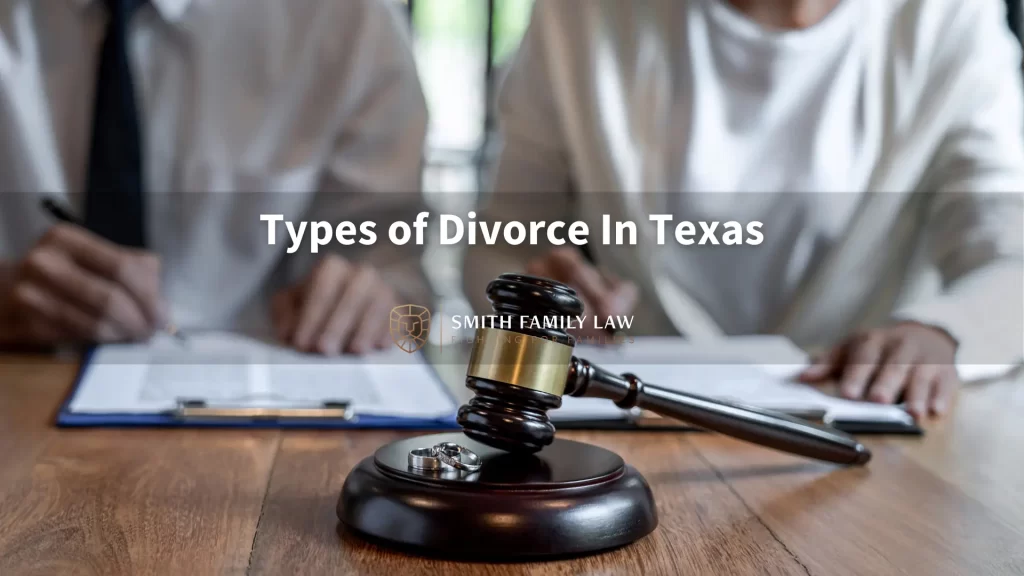
Are you planning on getting a divorce in Austin, Texas? If so, it’s essential to understand the different types of divorce in Texas.
The type of divorce you get can influence everything from its cost to how much of the marital property you receive. Understanding the different types of divorce that are available in Texas can help you prepare for the experience more effectively.
Different Types of Divorce in Texas
Various factors can influence the nature of your Texas divorce. You may not always be able to choose what type of divorce you get.
Common types of divorce in Texas are:
- No-Fault Divorce
- Fault Divorce
- Uncontested Divorce
- Contested Divorce
- Default Divorce
- Collaborative Divorce
Factors that may affect the type of divorce you get include whether your spouse agrees to the divorce, whether anyone has engaged in wrongdoing, and your willingness to compromise. That said, you should never compromise in a way that violates your rights.
No-Fault Divorce
Texas is a no-fault divorce state. According to the Texas Family Code, a spouse doesn’t have to prove their spouse engaged in any misconduct to get a divorce. Someone can divorce their spouse in Texas simply because they believe they can’t save the relationship.
No-fault divorce is the most common type of divorce in Texas. The benefits of a no-fault divorce include:
- No-fault divorces are often more civil than fault divorces.
- Finalizing a no-fault divorce may be more affordable and easier than finalizing a fault divorce.
- A no-fault divorce may be less complicated for the children.
- Information about divorce cases is typically publicly available in Texas. You might not want other people to learn about the details of a messy divorce. In a no-fault divorce, the public details of your divorce may be less embarrassing.
A no-fault divorce can result in a more nearly 50/50 split of marital property. Because no one is “to blame” for the divorce, neither spouse “deserves” more property than the other.
Fault Divorce
Fault divorces in Texas may arise when a spouse can cite various forms of misconduct as a reason for getting a divorce. Reasons for a fault-based divorce include:
- Cruelty
- Adultery
- Felony conviction
- Abandonment
If a spouse can prove the other spouse was at fault for the breakdown of the marriage, it may affect the final divorce terms. The spouse who is at fault in these circumstances may receive less of the marital property than the other.
Uncontested Divorce
An uncontested divorce is one in which spouses agree to the terms of the divorce. In an uncontested divorce, spouses don’t engage in any litigation or mediation. Instead, they arrive at a divorce agreement on their own. A professional familiar with Texas divorce law can help them turn their draft agreement into an enforceable contract.
An uncontested divorce may seem ideal when compared to other types of divorce in Texas. However, reaching an agreement with your spouse before scheduling a consultation with a divorce attorney may be unwise.
You need to understand your rights when getting a divorce in Texas. A final divorce agreement may not be fair to you if you don’t consult with an attorney. Family law attorneys can help their clients avoid agreeing to unfair terms.
In addition, ensuring a fair split of assets may require making an inventory of assets first. Spouses proceeding with uncontested divorces may be unlikely to take this step. Failure to do so can cause one spouse to receive less than they deserve.
Contested Divorce
It’s not uncommon for spouses to disagree on the terms of a divorce. Matters on which they may disagree include:
A contested divorce is one in which spouses disagree about these types of issues. The divorce process in a contested divorce may include hearings, negotiations, and mediation.
The goal is for spouses to work through their disagreements. Even in a contested divorce, spouses may be able to compromise, although that’s not always possible. When spouses can’t agree to the terms of a divorce, a judge will have to make key decisions for them.
Default Divorce
In Texas, the divorce filing process involves:
- Filing a petition for divorce in the district court in the county where either spouse has resided for at least the last 90 days (provided they’ve resided in Texas for at least six months)
- Serving a spouse with divorce papers
Upon receiving divorce papers, a spouse has a certain amount of time to respond to them. They may determine the deadline for responding by counting 20 days from the day they received divorce papers. Their response is due the following Monday. If the court isn’t open on that Monday, their response is due the next day the court is open.
A spouse might not respond to divorce papers. If they don’t, the spouse who filed them can receive a default divorce. In Texas, a judge can grant a divorce even if only one spouse signs the divorce decree.
Collaborative Divorce

Collaborative divorce offers some of the benefits of mediation. However, it’s not the same.
In a collaborative divorce, both spouses hire family law attorneys. They can’t have the same attorney.
A collaborative divorce usually involves multiple meetings. These meetings may include both spouses and their lawyers. In some instances, they may also include neutral experts, such as financial advisors, who can help them discuss relevant issues. The purpose of these meetings is to address the various issues on which spouses disagree.
Handling a divorce in this way allows spouses to control the terms to some extent. Reaching agreements outside of court may be preferable to letting a judge make decisions about important issues.
Contact an Austin, Texas, Divorce Lawyer
No matter what type of divorce you’re getting in Texas, it’s important to have assistance from a Texas law professional. You need someone on your side who is qualified to fight for your rights.
That’s exactly what you’ll find at Smith & Bledsoe Family Law. Our team of Austin, Texas, divorce lawyers will help you navigate this process with confidence. Get started today by contacting us online or calling us at (512) 277-3166 for a free case review.
Related Reading: